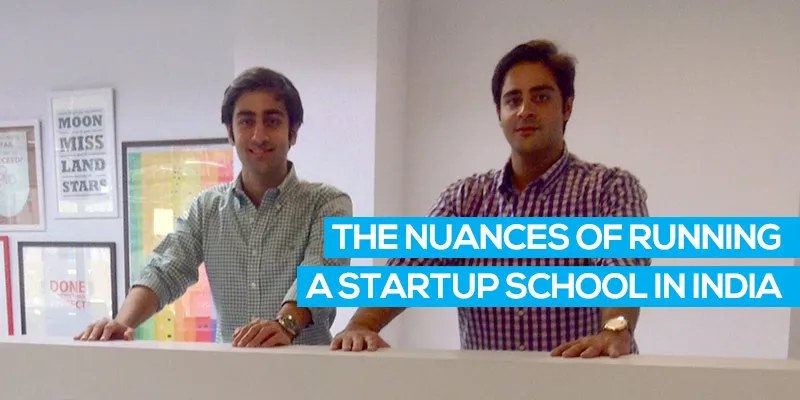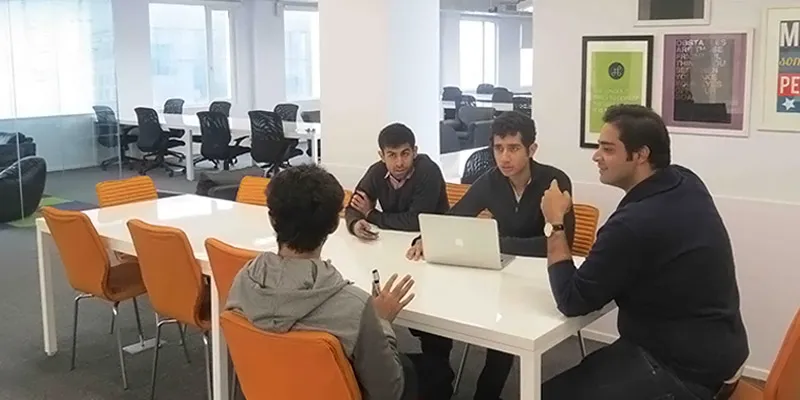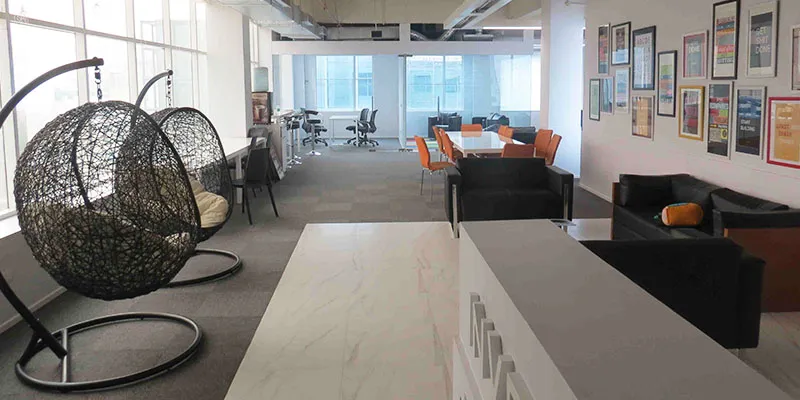Investopad: How this startup school will get you started
All of us know that the Indian startup ecosystem is buzzing with activity. Everyday startups are being founded, entrepreneurs are racing to build the next big business, and inevitably, startup schools are today’s most sought after business schools. By picking up teams and ideas that are most likely to succeed, they play the key role of talent-spotters for investors scouting for the best bets. YourStory quizzed the latest entrant in the space, Investopad, who is championing technology entrepreneurship in the National Capital Region (NCR) in detail.
Founded by brothers Rohan and Arjun Malhotra, Investopad seek to be an open platform for technology entrepreneurship that caters to and enables interaction between the entrepreneurship side of the ecosystem (startups, designers, engineers, marketers) and the investment side (accelerators, funds, angel investors, mentors).

Earlier, Rohan and Arjun worked in London and the US after graduating from the University of St. Andrews, UK. While Rohan was a sports agent in London, Arjun worked on the finance side for a fund in the Silicon Valley. Soon, Arjun convinced Rohan to startup with him in the equity crowd funding space. They worked with other teams, were mentored by top investors and ex-entrepreneurs, and got the support of incubators. This experience pointed out the difference they could make to the Indian startup ecosystem if they could bring together different elements that form an integral support to drive the growth of companies. That’s how the Investopad idea was sown.
Being an open platform, Investopad have already partnered with NASSCOM’s 10,000 Startups initiative, are hosting the GSF Accelerator and have given hand-picked VCs and angel investors free access to their Campus in Gurgaon. They have linked with a worldwide mentor network and other entrepreneurship hubs.
Excerpts from an interview:
What are the challenges you face at Investopad and how do you plan to overcome them?
An early challenge was accessing startups at an ideation stage. We approached this in two ways:
1) Firstly by bringing startups to our space via events
2) Secondly by apprising investors of our activities.
Our immediate concern is to have a high quality filter so we intend to continue working alongside investors. This approach is particularly fruitful in bringing us a high caliber of entrepreneurs, albeit at a slow and steady pace.
We are now slowly going to open up to more events but will focus on high-impact partnerships.
Related: The rise of Gangs of ‘Morpheus’pur
From a startup's points of view, what are the pain points you are resolving?
Operational headaches like rent, commute, security, electricity, internet breakdowns, etc. can all contribute to a startup’s failure. At Investopad, there’s no nickel-and-diming; everything founders need is included and our facilities are truly world class. We’re startup-friendly and we will be fighting in the trenches along with the best entrepreneurs. We’re located opposite Medanta in the Institutional area in Gurgaon and our neighbours are reputable organisations like McKinsey, NIIT and ITC.
It’s also a plug and play model for the startups– we don’t want them to worry about incorporation, structuring, book keeping, etc. so we have partnered with external service providers to help get them started in all of these areas.
In terms of adding value, the most important areas are digital marketing and design. Our focus on these two areas allows technology-driven startups to completely focus on product and not have to worry about the arts of marketing and design. As Investopad takes on the burden of these areas, founders are free to focus on what they’re good at and we work with them to manage these disciplines. As startups scale, we also handle a large chunk of the hiring process to ensure a smooth knowledge transfer. In certain cases, people from our team that have worked closely with the startup may join them in a more formal capacity if required.
Another area we are focusing on is mentorship. The global reach of our mentor network, which includes domain experts, ex-entrepreneurs and investors, ensures startups have exposure to and advice in targeting all sorts of markets.

For mentoring to work, founders and mentors have to be well matched. How will you ensure that?
When mentors sign up, they have to indicate their areas of expertise, experience and market-specific knowledge. We also have strong personal relationships with all of these mentors. Our database is available to our startups, founders have their pick on the mentors that they feel would add most value. We believe real mentoring is not one-off sessions, but rather sustained interaction over a longer period of time that sees value both in the growth of the entrepreneur as well as in increasingly refined insights offered by mentors. We also encourage mentors to have some ‘skin in the game’ by personally investing in startups that they would like to mentor.
We arrange two kinds of mentoring:
1) In the first, founders make the request to be connected with mentors and we arrange the initial meetings. Through the first few interactions we talk with both parties about the insights given, the deliverables suggested, ensure that incentives are aligned and expectations are managed between founders & mentors. We also try to connect founders to other mentors whose experience may lead them to offer very different viewpoints. The idea is to give founders as much useful guidance as we can (from all perspective), but ultimately they are the founders and must make the best decision for their startup based on the information that they gain.
2) In the second, we encourage mentors to hold “office-hours”. They take a day out of their calendar to work out of one the conference rooms at Investopad and can be freely accessed by startups at Investopad. We introduce them to each startup and give 1-hour slot meetings which are available to founders on a first-come-first-serve basis. When startups find value in the mentors’ insight, this lays the groundwork for more sustained and long-term mentoring.
How many proposals are you getting? How do you pick the ones to support?
At this point, a couple of enquiries a week. It’s still very early and as we have a lot of events lined up (SW NEXT pre-accelerator program, GSF Hacks in partnership with Investopad, GSF Accelerator, How to Run a Tech Startup course, etc.) we will see that number go up. We’re not in a rush to fill up the space and our priority is to focus on high-caliber people rather than filling up seats.
Consequently, almost all our enquiries come through our network – generally introductions from very early-stage startups that VC’s and angels are looking at. Our model also complements them very well – they may see promising companies at too early a stage and we can work alongside those companies to make them ‘investor worthy’ over a period of a few months.
The referral is very important to us and plays a part in the screening process. If a VC is suggesting that we take a look at a startup, then they have seen some potential in it and recognize where we can add value. Our screening is very people-driven rather than idea driven. We like to spend some time with the whole team and learn about their background, their skills – it’s important to understand where the knowledge gaps are and whether founders can acknowledge where they need help. If we feel like it’s a good fit and we can add value, then we make it into an arrangement. Culture is very important too and spending time with the team allows us to evaluate whether it will be a cultural fit too.

What are the other investments you make in the startups you pick?
In terms of time investment, it really varies depending on where the startup is.
At an idea stage, we won’t typically dedicate many resources to the founder. Instead, we will drive them to focus on concrete quantitative validation. Customer validation must be done by the founder. We don’t encourage them to go into build mode immediately but to work hard to validate the problem, the solution and then all aspects of their business model. If we don’t see founders focus enough on concrete data-driven validation, then it is not a good fit for us to support. Only once we see enough validation or proof-of-concept does a startup move to the go-to-market (iteration 1) stage. This is the stage in which we will typically dedicate immense time and resources to the team. We will work closely with them and ensure effective marketing and design while founders focus on building product.
In terms of marketing, that means branding, positioning, social media, content creation (video, images, infographics, blog posts), content roadmaps. For design, that includes building the user interface as well as visual design components, so the total product’s user experience is built with a lot of input from us. We also create the infrastructure for measuring analytics, user behaviour and transacting.
Once iteration 1 is out to market, most of the initial legwork is done. In transitioning from iteration 1 to the iteration 2 stage, we’re more data-driven based on our analytics so most processes get automated. We still dedicate resources but in a more part-time manner as the need of the hour then becomes continually iterating until product-market fit is reached. Here, founders have to work hard on understanding user behaviour and adapting to it. Over this period, the startup will typically look to grow their own teams so we focus on sourcing hires, training and ensuring sufficient knowledge-transfer before product-market fit is reached. As soon as this is achieved, startups look to scale. At this point, our work is done and our resources function as a backstop in case a startup suddenly blows up and lacks capacity to manage it. Our work generally then becomes helping founders in capital-raising.
In terms of monetary investments, so far we have typically put in around ~$50,000 per investment. The idea is however to bring this number down to about $15-$30,000 and focus on betting on a few more startups. We have the capacity to double-down in a Series A, but the bigger need for the startup is to have someone willing to take a bet during the seed stages.
You can check out Investopad here.
What do you think a startup school in India should focus on? Tell us in the comments below.







